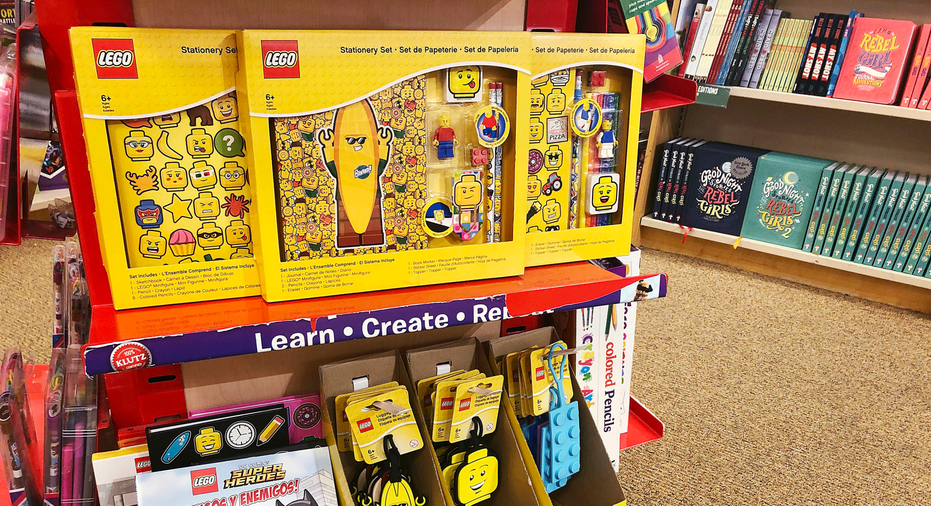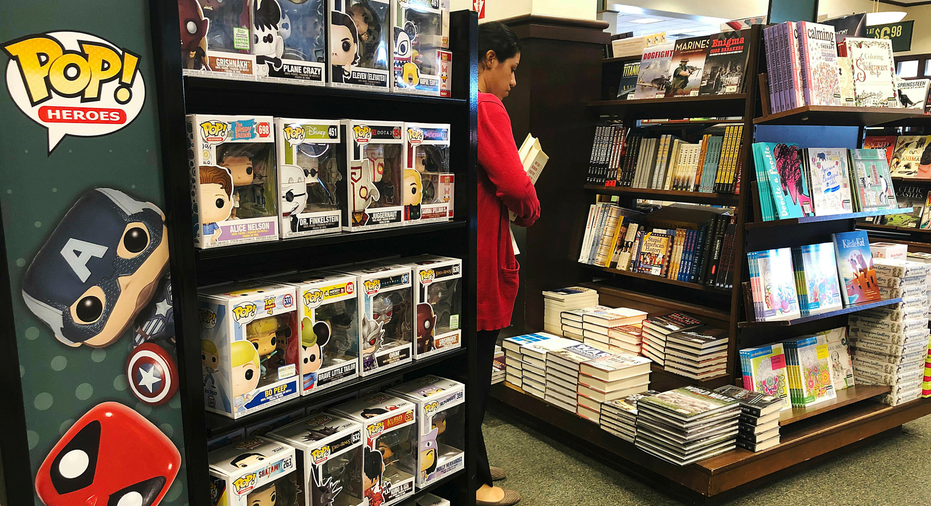'Sideline' products will be in the spotlight at BookExpo
LEGO merchandise is displayed at Barnes and Noble bookstore on Tuesday, May 28, 2019, in Pembroke Pines, Fla. At this year’s national publishing convention, BookExpo, non-book items will be a main attraction. Non-book products can account for 20 percent or more of overall sales at bookstores. BookExpo runs Wednesday to Friday in New York. (AP Photo/Brynn Anderson)
NEW YORK – For as long as she's been a bookstore owner, Gayle Shanks has been an advocate not just for books, but for what some sellers call "sideline" products, from pens to notepads to coffee mugs.
"I've spent an enormous part of my career as a bookseller trying to convince my fellow booksellers that gifts are an enhancement to their stores, a profitable one," says Shanks, who has helped run Changing Hands Bookstore in Tempe, Arizona, for more than 40 years. "I can't imagine a store without sidelines these days. They've finally learned!"
At this year's national publishing convention, BookExpo, the sideline part of the business will be a main attraction. BookExpo, which runs Wednesday to Friday, will feature such companies as Taza Chocolate, Calypso Cards and Streamline Inc. in an "UnBound" section at the Jacob Javits Convention Center. Jenny Martin, event manager for BookExpo and for BookCon, the fan-based show which immediately follows BookExpo, says the "UnBound" exhibits and programs are meant to help booksellers "integrate merchandise in an effective way."
Non-book items are standard for Amazon.com and other online sellers, but for physical stores the sideline market is also an established and important source of income. A Barnes & Noble store that opened recently in Rochester Hills, Michigan, includes "an amazing selection of educational toys and games, family games and puzzles and curated gift items for avid readers," the superstore chain announced in March.
Oren Teicher, CEO of the American Booksellers Association, the trade group for independent stores, says non-book products can account for 20 percent or more of overall sales. Because most sideline merchandise, unlike books, doesn't have a listed price, sellers have more flexibility in how much to charge. With profit margins often tiny, sideline purchases can be the difference between making and losing money.
"It's an absolutely indispensable piece of the pie," Teicher told The Associated Press during a recent telephone interview. "The challenge is to make sure the store looks like a bookstore. The 20 percent of products you sell doesn't have to take up 20 percent of the space. It can take up 10 percent of the space."
Some stores blend books and sideline items right into their names, like Element of Fun Books & Toys, based in Rochester, New York. At Changing Hands, customers can buy scarves, socks, garden accessories and pottery, part of Shanks' aim for her store to be "a one-stop shopping experience."
Warwick's in San Diego is divided into areas for books and non-books.
"I jokingly call us the 'everything store' because we do have cards, mailing supplies, filing folders and fine pens," says Adrian Newell, Warwick's' head books buyer and operations manager. "And the two sides complement each other. We know people who look for other things and then buy books, or regulars who come in, buy the newest book and then walk to the other side of the store and get a card."
Books will still take up much of the space at the Javits center. Guest speakers, all with upcoming releases to promote, include Ta-Nehisi Coates, Rachel Maddow, Lupita Nyong'o and Supreme Court Justice Sonia Sotomayor. Among others attending are Jason Reynolds, Lyz Lenz, R.J. Palacio, Jennifer Weiner and Laurie Halse Anderson. Events will include author breakfasts and luncheons, "Buzz" panels for some of the most anticipated books of the next few months, and an audiobook "tea," dedicated to the industry's fastest growing format.
Panel discussions will touch upon podcasts, literary criticism, digital marketing and trends in children's books.
Independent booksellers will hold their traditional "Town Hall," and can share news that the booksellers association again gained membership, rising from 1,835 individual companies (all but a handful independently owned stores) a year ago to 1,887, an increase of more than 20 percent since 2009. The number of store locations is now 2,524, compared to 2,470 in 2018, as independent sellers such as Shakespeare & Co. in New York continue to expand.
For years, the power of the superstore chains Barnes & Noble and Borders and the emergence of Amazon led to dramatic shrinkage in the independent market and concerns that local stores might not survive. But over the past decade, Borders has gone out of business and Barnes & Noble has scaled back amid ongoing financial struggles. Amazon's strength continues to grow, but the leveling off of e-book demand has stabilized the market for physical books.
Teicher says independent stores remain "fragile," vulnerable to higher rents, increases in the minimum wage and the continued growth of online retail. Revenues from the 650-750 reporting stores are up about 1 percent in 2019, compared to the more than 5 percent increase in 2018 over the previous year. And many sellers face the impending loss of a key wholesaler, Baker & Taylor, which announced earlier this spring that it was ending its retail wholesale business. But the independents "hold their own," Teicher adds, noting a crucial difference between now and years ago: While stores are still shutting down, more new ones are opening. According to the booksellers association, 99 new members opened in 2018, up from 75 in 2017.
Recent stores include Adventure Bound Books in Morganton, North Carolina, and Muddy Water Bookstore in Navasota, Texas.
"I'm living in a dream," says Muddy Water owner Suzie Linnenbank, who acknowledges that the business side of books has been an education. "Business is OK. It's up and down. I've probably been a little more successful than I thought, but still not exactly where I want to be. Then again, I haven't been open a year yet."





















